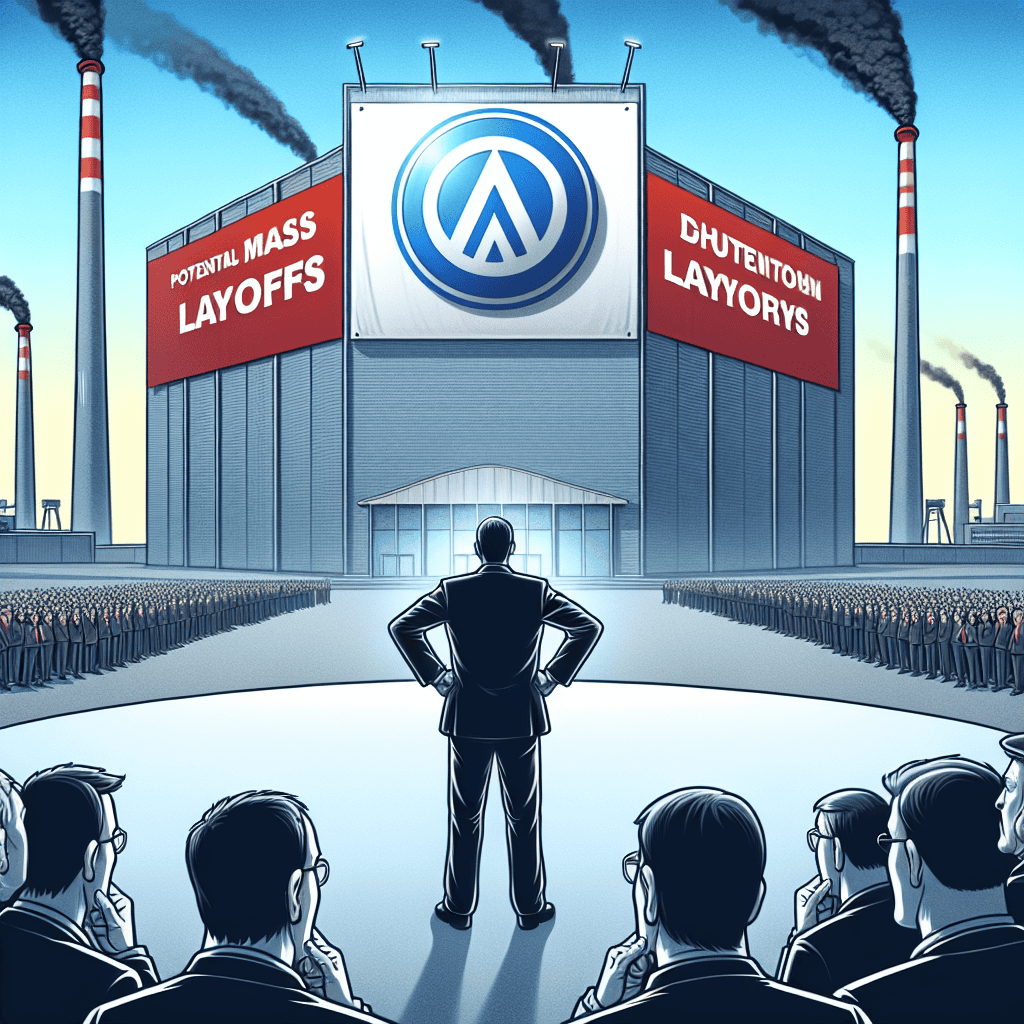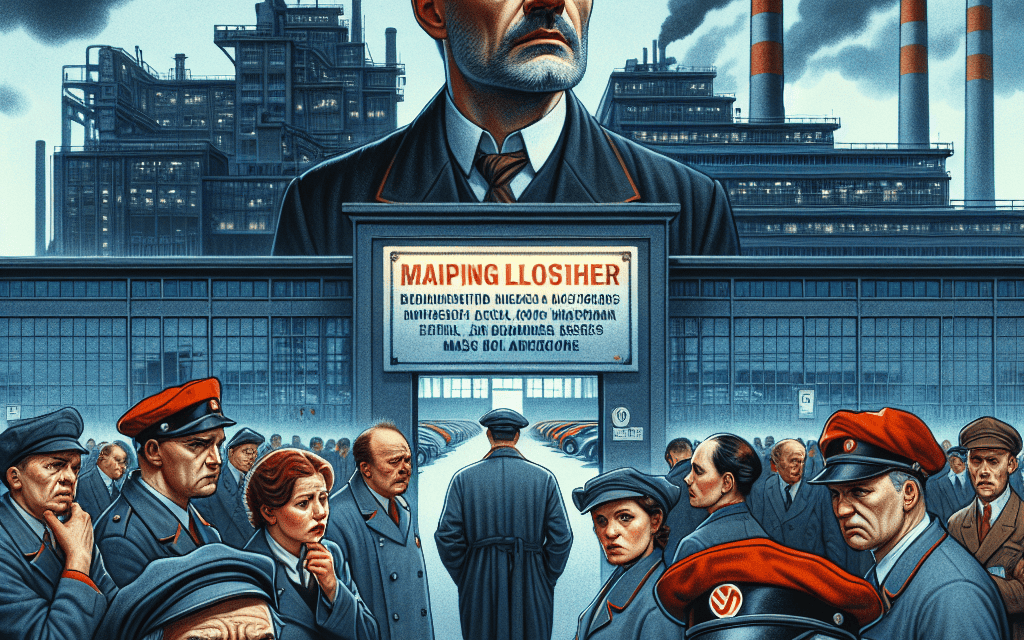“Volkswagen Faces Turbulence: Labor Chief Sounds Alarm on Job Cuts and Plant Closures in Germany”
Introduction
Volkswagen’s labor chief has issued a stark warning about potential mass layoffs and the closure of three key manufacturing plants in Germany. This alarming announcement underscores the mounting pressures faced by the automotive giant amid a rapidly evolving industry landscape. The warning highlights the challenges Volkswagen is grappling with, including the transition to electric vehicles, global supply chain disruptions, and increasing competition. The potential job losses and plant closures could have significant implications for the German economy and the thousands of workers employed by the company. As Volkswagen navigates these turbulent times, the labor chief’s cautionary message serves as a critical reminder of the urgent need for strategic adaptation and resilience in the face of industry transformation.
Impact Of Mass Layoffs On Volkswagen’s Workforce
The recent warning from Volkswagen’s labor chief regarding potential mass layoffs and the closure of three German plants has sent ripples of concern throughout the automotive industry and beyond. This development underscores the significant challenges facing one of the world’s largest car manufacturers as it navigates the rapidly changing landscape of the automotive sector. The potential impact on Volkswagen’s workforce is profound, with thousands of jobs at stake and the livelihoods of many families hanging in the balance.
To understand the gravity of this situation, it is essential to consider the broader context in which these warnings have emerged. The automotive industry is undergoing a transformative shift, driven by the increasing demand for electric vehicles, stringent environmental regulations, and the need for technological innovation. As a result, traditional car manufacturers like Volkswagen are under immense pressure to adapt their business models and production processes to remain competitive. This transition, while necessary, is fraught with challenges, particularly in terms of workforce management.
Volkswagen’s labor chief has highlighted the potential for mass layoffs as a direct consequence of these industry shifts. The transition to electric vehicles requires different manufacturing processes and skill sets, which may render some existing roles obsolete. Consequently, the company faces the difficult task of balancing the need for innovation with the responsibility of safeguarding its employees’ jobs. This delicate balancing act is further complicated by the economic pressures exacerbated by global supply chain disruptions and fluctuating market demands.
Moreover, the potential closure of three German plants adds another layer of complexity to the situation. These plants are not just production facilities; they are integral parts of their local communities, providing employment and economic stability. The closure of these plants would have a ripple effect, impacting not only the workers directly employed by Volkswagen but also those in ancillary industries and local businesses that rely on the economic activity generated by the plants. The social and economic implications of such closures cannot be overstated, as they would likely lead to increased unemployment and economic hardship in the affected regions.
In response to these challenges, Volkswagen must explore strategies to mitigate the impact on its workforce. This could involve investing in retraining programs to equip employees with the skills needed for the evolving automotive landscape. By doing so, the company can help ensure that its workforce remains relevant and capable of contributing to its future success. Additionally, Volkswagen could consider alternative measures, such as temporary reductions in working hours or voluntary redundancy schemes, to minimize the need for compulsory layoffs.
Furthermore, effective communication and collaboration between Volkswagen’s management and labor representatives will be crucial in navigating this period of uncertainty. Transparent dialogue can help build trust and foster a sense of shared purpose, enabling both parties to work together towards solutions that prioritize the well-being of the workforce while ensuring the company’s long-term viability.
In conclusion, the warning of mass layoffs and plant closures at Volkswagen highlights the significant challenges facing the automotive industry as it undergoes a period of unprecedented change. The potential impact on Volkswagen’s workforce is substantial, with far-reaching social and economic consequences. As the company seeks to adapt to the demands of the future, it must prioritize strategies that support its employees and maintain its commitment to being a responsible corporate citizen. Through proactive measures and collaborative efforts, Volkswagen can navigate this challenging landscape while safeguarding the interests of its workforce and the communities it serves.
Economic Consequences For German Communities
The recent warning from Volkswagen’s labor chief about potential mass layoffs and the closure of three German plants has sent ripples of concern through the communities that rely heavily on the automotive giant for economic stability. As one of the largest employers in Germany, Volkswagen’s operations are deeply intertwined with the economic fabric of numerous towns and cities. The potential impact of such a significant restructuring could be profound, affecting not only the employees directly involved but also the broader community ecosystems that depend on the company’s presence.
To begin with, the immediate consequence of plant closures would be the loss of thousands of jobs. This would not only affect the workers but also their families, who rely on these jobs for their livelihoods. The ripple effect of such layoffs would extend to local businesses, from suppliers and contractors to small businesses like cafes and shops that cater to Volkswagen employees. The reduction in disposable income would likely lead to decreased spending, which could, in turn, result in further job losses in these ancillary sectors. Consequently, the economic vitality of these communities could be severely compromised.
Moreover, the potential plant closures would have significant implications for local governments. With a reduced workforce, there would be a corresponding decrease in tax revenues, which are crucial for funding public services such as education, healthcare, and infrastructure maintenance. This could lead to budget shortfalls, forcing local authorities to make difficult decisions about which services to cut or scale back. The social fabric of these communities could be strained as a result, with increased pressure on social services and potential rises in unemployment-related issues such as mental health challenges and crime rates.
In addition to the immediate economic impacts, there are longer-term considerations to bear in mind. The closure of major industrial plants can lead to a decline in the attractiveness of a region for future investment. Potential investors may perceive these areas as economically unstable, which could deter new businesses from setting up operations. This could lead to a vicious cycle of economic decline, where the lack of new investment further exacerbates the economic challenges faced by the community.
However, it is important to consider potential strategies for mitigating these impacts. One approach could involve efforts to diversify the local economy, reducing reliance on a single industry or employer. This could involve investing in education and training programs to equip the workforce with skills relevant to emerging industries, such as renewable energy or technology. Additionally, local governments and community leaders could work to attract new businesses by offering incentives or creating business-friendly environments.
Furthermore, there is a role for Volkswagen itself in managing the transition. The company could explore options for repurposing the affected plants or investing in new technologies that could create alternative employment opportunities. By engaging with local stakeholders, Volkswagen could help to develop strategies that support both the company’s long-term goals and the economic resilience of the communities involved.
In conclusion, while the warning of potential mass layoffs and plant closures by Volkswagen’s labor chief presents significant challenges, it also underscores the need for proactive measures to support affected communities. By fostering economic diversification and collaboration between businesses, governments, and communities, it may be possible to mitigate the adverse effects and pave the way for a more resilient economic future.
Volkswagen’s Strategic Response To Industry Challenges
In recent developments, Volkswagen’s labor chief has issued a stark warning regarding potential mass layoffs and the closure of three German plants, a move that underscores the significant challenges facing the automotive giant. This announcement comes amid a rapidly evolving industry landscape, where traditional car manufacturers are grappling with the dual pressures of transitioning to electric vehicles and navigating the economic uncertainties exacerbated by global events. As Volkswagen seeks to maintain its competitive edge, the company is compelled to reassess its operational strategies, which may involve difficult decisions impacting its workforce and production facilities.
The automotive industry is undergoing a profound transformation, driven by the urgent need to reduce carbon emissions and meet stringent environmental regulations. For Volkswagen, this means accelerating its shift towards electric mobility, a transition that requires substantial investment in new technologies and infrastructure. However, this strategic pivot is not without its challenges. The high costs associated with developing electric vehicles, coupled with the need to phase out internal combustion engines, place considerable financial strain on the company. Consequently, Volkswagen must balance its long-term sustainability goals with immediate economic realities, a task that is proving increasingly complex.
In light of these challenges, Volkswagen’s labor chief has highlighted the potential for significant workforce reductions and the closure of key production sites in Germany. This warning serves as a sobering reminder of the human impact of industry shifts, as thousands of jobs hang in the balance. The potential plant closures would not only affect the employees directly involved but also have broader implications for the local economies that rely heavily on these facilities. As such, Volkswagen faces the delicate task of managing its workforce transition while minimizing social and economic disruptions.
To navigate these turbulent times, Volkswagen is exploring various strategic responses. One approach involves enhancing operational efficiency across its production network. By streamlining processes and adopting advanced manufacturing technologies, the company aims to reduce costs and improve productivity. Additionally, Volkswagen is investing in upskilling its workforce, equipping employees with the necessary skills to thrive in an increasingly digital and electrified automotive landscape. This focus on workforce development is crucial, as it enables the company to retain talent and maintain a competitive advantage in a rapidly changing market.
Moreover, Volkswagen is actively seeking partnerships and collaborations to bolster its position in the electric vehicle sector. By joining forces with technology companies and other industry players, Volkswagen can leverage shared expertise and resources to accelerate innovation and reduce development costs. These strategic alliances are vital for fostering a robust ecosystem that supports the company’s long-term growth objectives.
In conclusion, Volkswagen’s warning of potential mass layoffs and plant closures highlights the significant challenges the company faces as it navigates the transition to electric mobility. While these measures may be necessary to ensure the company’s future viability, they also underscore the need for a balanced approach that considers both economic imperatives and social responsibilities. As Volkswagen continues to adapt to the evolving industry landscape, its strategic responses will play a crucial role in shaping the company’s trajectory and its impact on employees, communities, and the broader automotive sector. Through careful planning and collaboration, Volkswagen aims to emerge stronger and more resilient in the face of these unprecedented challenges.
The Role Of Labor Unions In Protecting Jobs

In recent developments, the labor chief of Volkswagen has issued a stark warning regarding potential mass layoffs and the closure of three German plants. This announcement has sent ripples through the automotive industry, highlighting the critical role labor unions play in safeguarding jobs. As the automotive sector faces unprecedented challenges, labor unions are increasingly becoming pivotal in negotiating terms that protect workers’ interests. The situation at Volkswagen underscores the importance of these organizations in mediating between corporate objectives and employee welfare.
Labor unions have historically been instrumental in advocating for workers’ rights, ensuring fair wages, and securing safe working conditions. In the context of Volkswagen, the labor union’s involvement is crucial as it seeks to mitigate the impact of potential job losses. The automotive industry is undergoing a significant transformation, driven by the shift towards electric vehicles and the integration of advanced technologies. This transition, while necessary for environmental sustainability, poses a threat to traditional manufacturing jobs. Consequently, labor unions are tasked with the formidable challenge of balancing the need for innovation with the preservation of employment.
Moreover, the potential closure of Volkswagen’s German plants raises concerns about the broader economic implications. These plants are not only vital to the company’s operations but also to the local economies they support. The ripple effect of such closures could lead to a downturn in related industries, affecting suppliers and service providers. Herein lies the critical role of labor unions in negotiating with management to explore alternative solutions that could prevent such drastic measures. By engaging in dialogue with corporate leaders, unions can advocate for strategies that prioritize retraining and redeployment of workers, thereby minimizing job losses.
Furthermore, labor unions serve as a voice for employees, ensuring that their concerns are heard and addressed during negotiations. In the case of Volkswagen, the labor chief’s warning is a call to action for both the company and the union to collaborate in finding viable solutions. This collaboration is essential in fostering a work environment that is adaptable to change while still valuing the contributions of its workforce. Through collective bargaining, unions can push for policies that support job security, such as investment in new technologies and the development of skills training programs.
In addition to protecting jobs, labor unions also play a crucial role in maintaining industrial harmony. By acting as intermediaries between employees and management, they help to prevent conflicts that could lead to strikes or work stoppages. In the current climate, where the automotive industry is facing mounting pressures, maintaining a stable workforce is more important than ever. Labor unions, therefore, are indispensable in ensuring that any transitions are smooth and that workers are not unduly disadvantaged.
In conclusion, the warning from Volkswagen’s labor chief about potential layoffs and plant closures serves as a reminder of the vital role labor unions play in protecting jobs. As the automotive industry navigates through transformative changes, the presence of strong labor unions is essential in advocating for workers’ rights and ensuring that their voices are heard. By fostering collaboration between employees and management, labor unions can help to create a future where innovation and job security coexist, ultimately benefiting both the industry and its workforce.
Future Of Automotive Manufacturing In Germany
The automotive industry in Germany, a cornerstone of the nation’s economy, is facing unprecedented challenges as it navigates the transition to electric vehicles (EVs) and the pressures of global competition. Recently, a stark warning from Volkswagen’s labor chief has brought these issues into sharp focus, highlighting the potential for mass layoffs and the closure of three key manufacturing plants in Germany. This development underscores the broader challenges facing the automotive sector as it adapts to a rapidly changing landscape.
Volkswagen, one of the world’s largest car manufacturers, has been at the forefront of the shift towards electric mobility. The company has committed to investing billions in EV technology and infrastructure, aiming to become a leader in the electric vehicle market. However, this transition is not without its difficulties. The shift from internal combustion engines to electric drivetrains requires significant changes in manufacturing processes, supply chains, and workforce skills. As a result, traditional manufacturing jobs are at risk, and the need for retraining and reskilling workers has become more urgent than ever.
The warning from Volkswagen’s labor chief highlights the potential social and economic impact of these changes. The closure of three German plants would not only result in significant job losses but also have a ripple effect on local economies and communities that have long been dependent on the automotive industry. This situation raises important questions about the future of automotive manufacturing in Germany and the strategies needed to ensure a smooth transition to a more sustainable and technologically advanced industry.
Moreover, the potential layoffs and plant closures are indicative of broader trends affecting the global automotive industry. As companies worldwide strive to meet stricter environmental regulations and consumer demand for cleaner vehicles, they are compelled to rethink their production strategies. This often involves consolidating operations, investing in new technologies, and, unfortunately, reducing workforce numbers. The challenge for Germany, and indeed for other countries with a strong automotive presence, is to balance these necessary changes with the need to protect jobs and support affected workers.
In response to these challenges, there is a growing recognition of the need for comprehensive policy measures and industry collaboration. Governments, industry leaders, and labor unions must work together to develop strategies that support the transition to electric vehicles while minimizing the social impact. This could include initiatives such as investment in retraining programs, incentives for companies to retain and upskill workers, and support for regions heavily reliant on automotive manufacturing.
Furthermore, the situation at Volkswagen serves as a reminder of the importance of innovation and adaptability in the face of change. Companies that can successfully navigate the transition to electric vehicles are likely to emerge stronger and more competitive in the global market. This requires not only investment in new technologies but also a commitment to fostering a culture of innovation and continuous improvement.
In conclusion, the warning from Volkswagen’s labor chief about potential mass layoffs and plant closures is a stark reminder of the challenges facing the automotive industry in Germany. As the sector undergoes a profound transformation, it is crucial for all stakeholders to work together to ensure a sustainable and equitable transition. By embracing innovation, supporting workers, and fostering collaboration, Germany can continue to be a leader in automotive manufacturing while paving the way for a cleaner and more sustainable future.
Volkswagen’s Transition To Electric Vehicles
Volkswagen, a titan in the automotive industry, is navigating a pivotal transition as it shifts its focus from traditional internal combustion engines to electric vehicles (EVs). This strategic pivot, while essential for aligning with global environmental goals and staying competitive in a rapidly evolving market, is not without its challenges. Recently, Volkswagen’s labor chief issued a stark warning about the potential for mass layoffs and the closure of three German plants, underscoring the profound impact this transition could have on the company’s workforce and operations.
The automotive industry is undergoing a seismic shift as manufacturers worldwide embrace electrification. For Volkswagen, a company with deep roots in Germany and a significant global presence, this transition is both an opportunity and a formidable challenge. The move towards electric vehicles is driven by a combination of regulatory pressures, consumer demand for sustainable options, and the need to innovate in a competitive landscape. However, the shift also necessitates a reevaluation of production processes, supply chains, and workforce requirements.
Volkswagen’s labor chief has highlighted the potential consequences of this transition, particularly concerning employment. The production of electric vehicles is markedly different from that of traditional cars, often requiring fewer components and less labor-intensive assembly processes. This efficiency, while beneficial from a production standpoint, poses a threat to jobs, especially in regions heavily reliant on automotive manufacturing. The warning of mass layoffs and potential plant closures in Germany is a stark reminder of the human cost associated with technological advancement and industry transformation.
The potential closure of three German plants is particularly concerning given the country’s historical ties to Volkswagen and its role as a hub for automotive innovation and production. These plants are not just centers of manufacturing; they are integral to the communities they support, providing employment and economic stability. The prospect of their closure raises questions about the future of these communities and the broader implications for Germany’s industrial landscape.
In response to these challenges, Volkswagen is likely to explore various strategies to mitigate the impact on its workforce. This may include retraining programs to equip employees with the skills needed for new roles in the EV sector, as well as exploring opportunities for redeployment within the company. Additionally, Volkswagen may seek to collaborate with government bodies and industry partners to develop comprehensive support systems for affected workers and communities.
While the transition to electric vehicles presents significant challenges, it also offers Volkswagen an opportunity to redefine its brand and reinforce its commitment to sustainability. By investing in EV technology and infrastructure, Volkswagen can position itself as a leader in the green automotive revolution, appealing to environmentally conscious consumers and aligning with global sustainability goals.
In conclusion, Volkswagen’s transition to electric vehicles is a complex and multifaceted endeavor that holds both promise and peril. The warning of potential mass layoffs and plant closures serves as a sobering reminder of the challenges that accompany such a significant industry shift. As Volkswagen navigates this transition, it will need to balance innovation with responsibility, ensuring that its pursuit of a sustainable future does not come at the expense of its workforce and the communities it serves. Through strategic planning and collaboration, Volkswagen can strive to achieve a transition that is both economically viable and socially responsible, setting a precedent for the automotive industry at large.
Global Implications Of Volkswagen’s Plant Closures
The recent warning from Volkswagen’s labor chief about potential mass layoffs and the closure of three German plants has sent ripples through the global automotive industry. This development not only highlights the challenges faced by traditional automakers in adapting to the rapidly changing landscape of the automotive sector but also underscores the broader economic implications that such closures could entail. As the industry shifts towards electric vehicles (EVs) and digitalization, companies like Volkswagen are under immense pressure to transform their operations, which often involves difficult decisions regarding workforce and production facilities.
The potential closure of these plants in Germany, a country renowned for its engineering prowess and automotive heritage, could have significant repercussions. Germany’s economy is heavily reliant on its automotive sector, which employs hundreds of thousands of people and contributes substantially to the nation’s GDP. Therefore, any disruption in this sector could have a cascading effect on the broader economy, affecting not only direct employees but also those in the supply chain and related industries. Moreover, the social impact of such closures cannot be overlooked, as communities that have long depended on these plants for employment and economic stability may face considerable hardships.
Transitioning to a more global perspective, Volkswagen’s situation is emblematic of a larger trend within the automotive industry. As companies worldwide grapple with the shift towards EVs, they are confronted with the need to re-evaluate their production strategies. This often involves consolidating operations, investing in new technologies, and, unfortunately, reducing their workforce. The move towards electric vehicles is driven by a combination of regulatory pressures, consumer demand, and environmental considerations. However, the transition is not without its challenges, as it requires substantial investment in new technologies and infrastructure, which can strain financial resources.
Furthermore, the potential plant closures in Germany could have implications for Volkswagen’s global supply chain. The interconnected nature of modern manufacturing means that disruptions in one part of the world can have far-reaching effects. Suppliers and partners who rely on these plants for business may find themselves in precarious positions, potentially leading to a ripple effect that impacts other regions and markets. This interconnectedness highlights the importance of strategic planning and adaptability in navigating the complexities of the global automotive landscape.
In addition to the economic and logistical challenges, there are also geopolitical considerations to take into account. As countries strive to position themselves as leaders in the EV market, competition is intensifying. Nations are investing heavily in developing their own EV industries, and any perceived weakness or instability in a major player like Volkswagen could shift the balance of power. This could lead to increased competition and potentially alter trade dynamics, as countries seek to protect their own industries and secure their positions in the global market.
In conclusion, the warning from Volkswagen’s labor chief about potential mass layoffs and plant closures serves as a stark reminder of the challenges facing the automotive industry today. As companies navigate the transition to electric vehicles and digitalization, they must balance the need for innovation with the economic and social realities of their operations. The implications of these decisions extend beyond the immediate impact on employees and local economies, influencing global supply chains, competitive dynamics, and geopolitical landscapes. As such, the situation at Volkswagen is not just a local issue but a reflection of the broader transformations reshaping the automotive industry worldwide.
Q&A
1. **What is the main concern of the Volkswagen labor chief?**
The Volkswagen labor chief is concerned about potential mass layoffs and the closure of three German plants.
2. **Which plants are at risk of closure?**
The specific plants at risk have not been detailed in the information provided.
3. **What is causing the potential layoffs and closures?**
The potential layoffs and closures are likely due to financial pressures, market changes, or strategic shifts within the company.
4. **How many employees could be affected by these layoffs?**
The exact number of employees that could be affected has not been specified.
5. **What is Volkswagen’s response to these warnings?**
Volkswagen’s official response to the labor chief’s warnings has not been detailed in the information provided.
6. **Are there any proposed solutions to avoid the layoffs and closures?**
Proposed solutions, if any, have not been mentioned in the information provided.
7. **What impact could these layoffs have on the local economy?**
The layoffs could have a significant negative impact on the local economy, affecting not only the employees but also local businesses and suppliers.
Conclusion
Volkswagen’s labor chief has issued a warning about potential mass layoffs and the closure of three German plants, highlighting significant challenges facing the company. This situation underscores the broader pressures within the automotive industry, including the transition to electric vehicles, economic uncertainties, and competitive market dynamics. The warning serves as a critical reminder of the need for strategic adaptation and workforce management to navigate these challenges effectively. The potential impact on employees, local economies, and the company’s operational capabilities could be substantial, necessitating careful consideration and planning to mitigate adverse effects.





